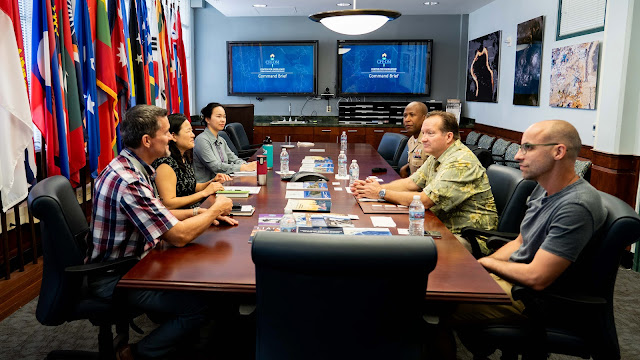USU National Center for Disaster Medicine & Public Health to Lead International Humanitarian Relief Workshop
The National Center for Disaster Medicine and Public Health to lead the long-running international Health Emergencies in Large Populations Workshop
 |
NCDMPH has taken over the direction of the long-running international Health Emergencies in Large Populations (HELP) Workshop. (Photo courtesy of CFE-DM) |
March 22, 2024 by Hadiyah Brendel
The National Center for Disaster Medicine and Public Health (NCDMPH), a center at the Uniformed Services University (USU), has taken over the direction of the long-running international Health Emergencies in Large Populations (HELP) Workshop.
The training brings together participants representing civilian and military organizations from 14 to 16 strategically prioritized countries in the Indo-Pacific region.
Previously, the Center for Excellence in Disaster Management and Humanitarian Assistance (CFE-DM) hosted the Wworkshop in partnership with the International Committee of the Red Cross (ICRC) and the University of Hawaii. Created in 1986, the training resulted from collaboration between the ICRC, the World Health Organization, and the University of Geneva.
The HELP Workshop training spans two weeks of lectures and workshops. Attendees concentrate on providing humanitarian relief during disasters, armed conflicts, and other health emergency events. Using multidisciplinary training based on scientific evidence, best practices, and professional ethics, the workshop develops the knowledge base, skills, and approach humanitarian workers will need to address those affected by a disaster.
The transition of the training between CFE-DM to the NCDMPH occurred in January. Taking over the HELP workshop expands NCDMPH’s portfolio to international landscapes, an area included in their mandate from the Homeland Security Presidential Directive 2008. As the CFE-DM is undergoing a shift away from a focus on health, it was a reasonable time for the NCDMPH to step in.
NCDMPH will partner with CFE-DM in instructing the workshop. Instructors include volunteers from international humanitarian communities, the Department of Defense, and other U.S. interagency organizations. Past subject matter experts have included personnel from Special Operations Command Pacific, as well as the Navy Environmental and Preventive Medicine Unit-6.
And with NCDMPH’s approach, the HELP workshop will continue to provide essential training to civilian and military professionals around the world responding to the most severe types of disasters, said Dr. Jeff Freeman, director of NCDMPH.
The workshop takes place each summer in Honolulu. Participation is largely by invitation only. Each year, workshop leadership sends a letter to the US embassies of participating nations. They are asked to nominate one person from a civilian organization, such as the Ministry of Health, and one from a military and/or security organization, such as the Ministry of Defense. This year, the workshop will take place from August 19-30.
“Most importantly, the HELP workshop brings together professionals representing humanitarian/civilian/defense organizations—enabling their exchange of knowledge and sharing of multidisciplinary experiences from public health to humanitarian aid,” said Freeman.
“We’re thankful to our CFE-DM colleagues for the opportunity to lead the HELP workshop and look forward to continuing this critical training in the region.”


